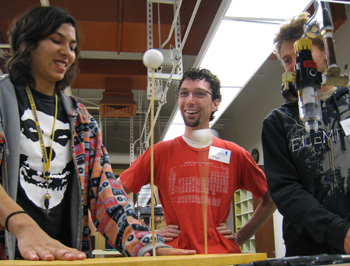Graduate students in science and engineering typically receive intensive training in research and relatively little guidance in teaching. A new institute at the University of California, Santa Cruz, aims to change that by preparing science and engineering graduate students for their educational role, whether as future faculty members or in the wide range of other careers that require teaching skills.
"Preparing graduate students to teach is something that has been neglected. There's a myth that grad students just want to focus on their research, but we've found that they are really interested in teaching and want help to do it better," said Lisa Hunter, director of the Institute for Scientist and Engineer Educators (ISEE) at UC Santa Cruz.
ISEE began as a professional development program that Hunter ran at the Center for Adaptive Optics (CfAO), a national science and technology center headquartered at UCSC. CfAO was funded by the National Science Foundation for 10 years, and ISEE is one of several CfAO spin-offs that will continue on their own after NSF funding for the center runs out in April.
Because CfAO was a national center, the professional development program worked with graduate students and other early-career scientists and educators throughout the country. ISEE will now focus on graduate students at UC Santa Cruz and the University of Hawaii, which was a partner in CfAO. The institute will work with students in a wide range of fields in science and engineering.
"It's a unique program--very few universities have anything like this," Hunter said.
ISEE participants recently completed a series of workshops to learn about effective teaching methods and strategies for creating equitable classrooms that support diversity. The 55 participants included 33 UCSC graduate students. Marc Bresler, a graduate student in chemistry and biochemistry, said the program not only has taught him new teaching methods, but has given him opportunities to teach and design course components that apply those methods.
"I know that my experiences and training will provide me with an edge when I look to achieve my career goals in academia," Bresler said.
ISEE is now housed administratively in the Division of Social Sciences, but also receives funding from the Division of Physical and Biological Sciences, Baskin School of Engineering, Division of Graduate Studies, Office of Research, and the Campus Provost/Executive Vice Chancellor. The University of Hawaii, where Hunter holds a joint appointment, also provides funding for the institute through grants from the NSF and the Air Force Office of Scientific Research.



